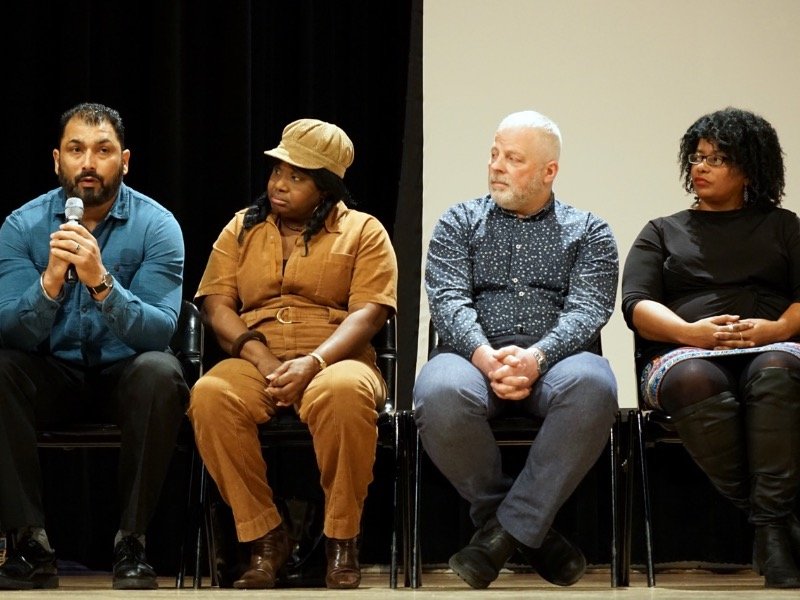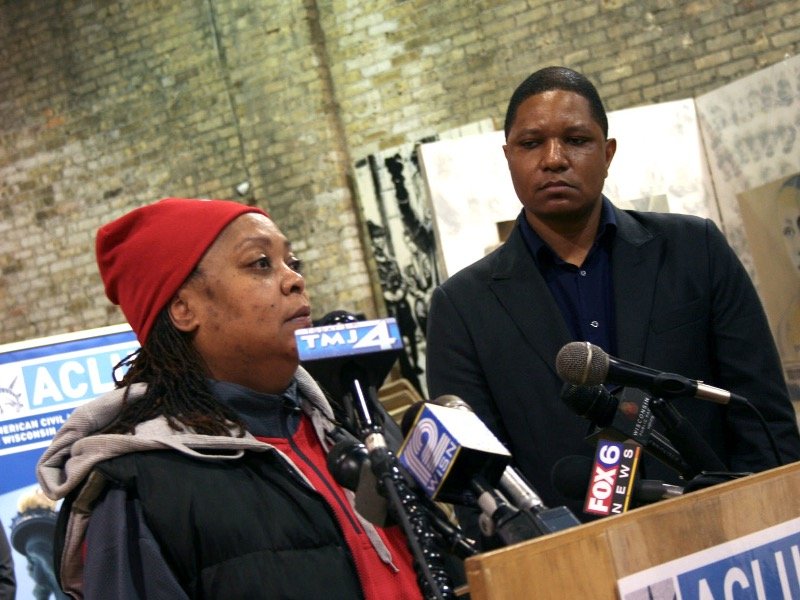The opinions expressed in this piece do not necessarily reflect the opinions of OnMilwaukee.com, its advertisers or editorial staff.
The late Nigerian novelist Chinua Achebe once said, "There are different forms of dispossession, many, many ways in which people are deprived or subjected to all kinds of victimization." Speaking about the power of literature, he continued, "Once you allow yourself to identify with the people in a story, then you might begin to see yourself in that story even if on the surface it’s far removed from your situation. It’s not difficult to identify with somebody like yourself, somebody next door who looks like you. What’s more difficult is to identify with someone you don’t see, who’s very far away, who’s a different color, who eats a different kind of food. When you begin to do that then literature is really performing its wonders."
In September, I will start my sophomore English classes with this quote, not only because we will later read Achebe's novel "Things Fall Apart," but also because Achebe's message defines the foundation for every day of instruction of every class I teach, every year I teach.
There's more, of course – writing well, thinking critically, making better decisions like keeping that phone in your pocket or solving conflicts with words rather than fists. But if my students get to the end of the year without gaining some empathy, without the ability to look at someone else's situation and not merely see it but identify with it in some way, then I have failed to do my job.
Achebe's words have been on my mind for the last week, for reasons I hope are obvious. I firmly believe that what the United States needs at this moment is more empathy, a greater sense of shared purpose and shared experience.
It is a grand overstatement to suggest that the U.S. in 2016 is more divided than ever before – I mean, we did have that whole Civil War thing, not to mention, say, the 1960s – but it is accurate to say that never before have so many fractures been so very visible at the same time. In Lincoln's day, the new-fangled telegraph system and the printing press allowed news of the war and the president's assassination to spread across the country within a day or two (it took the news a week on a steamship to reach Europe).
In the '60s, you had to wait for the evening news for footage of that day's riots and demonstrations. Today, it takes just microseconds for news to spread across social media platforms, even if some of that reporting is wrong, like the initial reports of multiple coordinated snipers in Dallas last week when it was just one man.
That immediacy contributes to how overwhelmed so many of us have felt the last couple of years in this country, to the fear that the social fabric is unraveling before our very eyes.
The reality, though, is that we are not only in a statistically safer and more peaceful moment than at any previous time in recorded history – a time when empathy is more and more the norm than antipathy or apathy – but I believe our connection on social media is accelerating that trend, despite how grim any given moment may seem these days.
Here's an example: We all know (or should know) the story of Emmett Till. But Till, as a victim of the white racist South of the last century, is an outlier; the vast majority of those who died are anonymous, and if we know their names, we know little about them. Till's murder was the exception that proved the rule. It opened many Northern eyes to the horrors that were happening in this country, in no small part because his mother and activist publishers in Chicago dared the world to look at Till's broken face.
Till's murder happened between the landmark Brown decision desegregating schools and the Montgomery bus boycott, right at a pivotal time for the nation and its nascent Civil Rights movement. Most of America did not know who Martin Luther King was and Lyndon Johnson was a decade away from strong-arming the Civil Rights Act through Congress and then passing the Voting Rights Act. But Till's death galvanized Northern support for civil rights, especially among whites who might not have given it a second thought, at a time when the country needed all the help it could get.
Till's open casket and brutal photographs were 1955's equivalent of today's smartphone footage and livestreams. When lynchings happened in the middle of the night in the middle of nowhere, when the only ones around to witness the lynchings fully supported what was happening, the perpetrators controlled the narrative. The literal and figurative darkness kept the rest of America from hearing the victims' stories, from developing the empathy necessary to propel the country into a real fight for civil rights.
For Till, though, his mother, the Chicago Defender and Jet Magazine wrested control of the narrative from the perpetrators. Today, when every corner store has security cameras and every potential witness has a smartphone with a camera, the perpetrators can't control the narrative anymore. We can watch, real-time, as peaceful marchers are tear-gassed and arrested for spurious reasons.
Last weekend, just hours after the carnage in Dallas, police in Houston shot a African American man they said was "waving a gun around and pointed it at them," though surveillance camera footage seems to show the man's hands empty and in the air. While this case is clearly ongoing, it's just the latest in a series of incidents in which the official police narrative contradicts or appears to contradict what's in video footage from security cameras, witness video or even their own body cameras.
And today, we know far more names than just one. Thousands who died as Emmett Till died are and were unknown. But from Trayvon Martin to Philando Castile, the last several years have produced a litany of names – though there is a strong case to be made that we should know many more names than we do. This, to me, is real progress, progress of a sort that Emmett Till's family and media champions could never have imagined.
But it makes us uncomfortable. Progress always does; even small changes are hard to deal with, and a shift in perspective of the size and import of what is happening today is doing a lot more than just making us fidget in front of our TV screens or scroll faster through Facebook. Not to get too political – though you should have known it was inevitable – but I believe this year's election is the consequence of this discomfort.
Donald Trump, presumptive Republican nominee, is clearly a relic of America's past, a near-literal personification of white privilege. He inherited his wealth and status, and has been able to trade on that for decades, building his brand and skating through various bankruptcies and personal and professional failings. His campaign has been a series of vaguely racist dog-whistles and blatant provocations that have attracted the support of many whites nursing a racial animus (does anyone look at Trump and think, "Yeah, that guy has empathy written all over him"?). But the resentful white man is a disappearing class, a shrinking minority, and this will probably be their last hurrah. They're also why so many mainstream and forward-thinking Republicans have refused to line up behind Trump or offer only tepid support: They know Trump represents the end of an era.
The presumptive Democratic nominee, Hillary Clinton, is (I think) on the right side of history when it comes to the issues of the moment, but she, too, represents much about the old America. Her rise from Goldwater Girl to Wellesley activist to First Lady is a path that in her generation was not available to much of America; she, like Emmett Till, was born in Chicago in the 1940s, but clearly was on a very different trajectory.
Larry Wilmore, of Comedy Central's "The Nightly Show," jokingly calls the 2016 "The Un-Blackening," as whoever takes the oath next January will almost certainly be white. However, if Clinton wins, she will continue the trend that began with the election of Barrack Obama in 2008. The White House may be un-blackened, but the era of the white male as the dominant cultural and political force will be over.
And how can it not be? There's a demographic inevitability, for one: White guys like me are a minority in the U.S. today (I'm okay with that. I don't need the pressure). For another, there's the democratization of media that comes when everyone has not just the means to passively watch media in their pockets, but also the means to actively produce it. That includes the ability to produce and control the narrative of what is happening to people like Alton Sterling and Sandra Bland and Sam Dubose and Eric Garner.
The power to spark empathy is not limited to literature. It also lives in the presidency of Obama, the candidacy of Clinton and the documentary evidence of the dispossession and victimization, to use Achebe's words, of the men and women around us in the U.S. today. I have to believe – I have to hope – that we will look back on this point in American history as we do 1955 or 1968, turbulent years that signaled not a breakdown of American society, but the birth of empathy. I have to believe that we're amid a shift in how we see and understand each other, and that the moral arc, to steal Dr. King's line, keeps bending toward equality and justice and peace.







